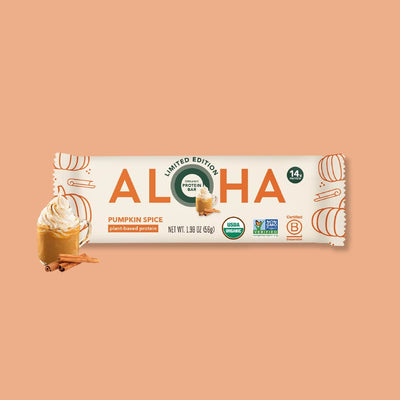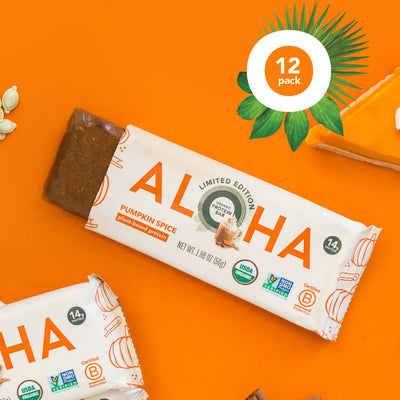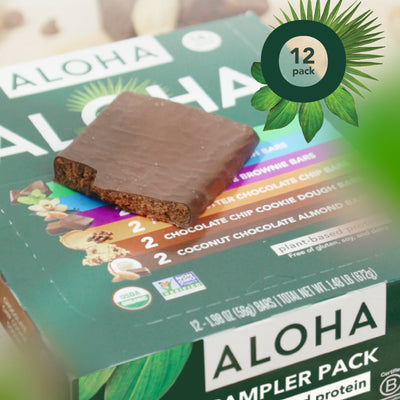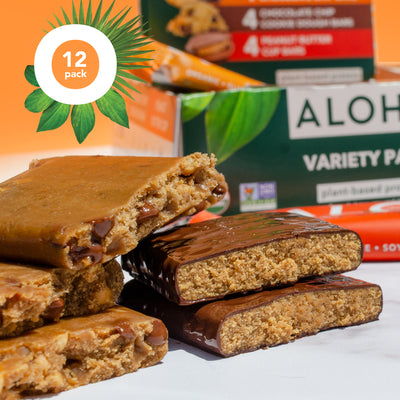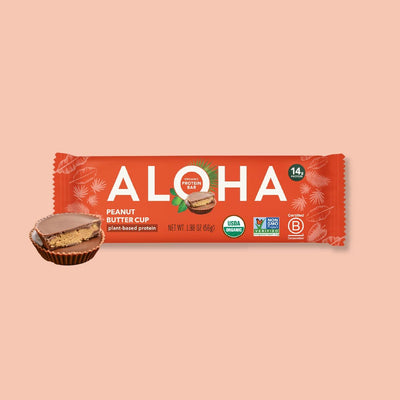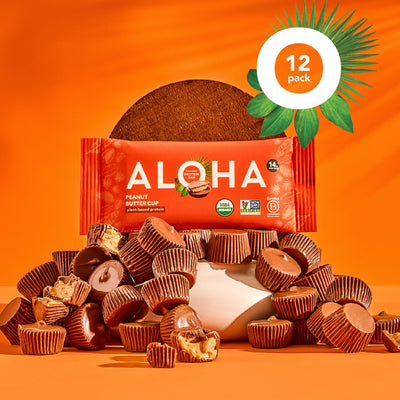Key Takeaways:
- Unique Flavors, Same Versatility: Almond butter and peanut butter each offer distinct tastes — one mild and sweet, the other bold and roasted — yet both can enhance plant-based meals.
- Simplicity Is Key: Both nut butters are made with minimal ingredients and no unnecessary extras, making them ideal for those who value clean and honest food choices.
- Choose Based on Preference: The best choice between almond butter and peanut butter depends on your taste, texture preference, and how you plan to use them in daily meals.
Is choosing between almond butter vs peanut butter simply a matter of taste, or is there more to the story? Understanding the subtle differences between these two popular spreads can make all the difference for anyone focused on eating clean, plant-based foods. Both have loyal fans and distinct personalities, offering unique flavors and textures that elevate everyday meals.
At ALOHA, we believe that food should be both nourishing and honest. As champions of organic, plant-based, and non-GMO nutrition, we create products that align with your values without sacrificing flavor. Our mission is to make choosing healthier options easy, delicious, and joyful every day.
In this piece, we’ll explain everything you need to know about almond butter vs. peanut butter, including their nutrition, taste, and how they can seamlessly fit into a mindful lifestyle.
Nutritional Profile: Peanut Butter Vs. Almond Butter
A good starting point is their basic nutritional breakdown when comparing almond butter vs. peanut butter. While both spreads offer rich flavors and creamy textures, they differ slightly in their natural composition.
Peanut butter generally provides a slightly higher amount of protein per serving, making it a favorite for those who want a hearty, satisfying option. Almond butter, on the other hand, boosts naturally occurring vitamins like vitamin E, along with important minerals such as magnesium and calcium.
Both almond butter and peanut butter are calorie-dense and primarily made up of healthy fats. Still, almond butter tends to have a slightly higher fat content because of the nut’s naturally rich oil profile. Peanut butter often contains more carbohydrates, though the difference is modest.
Whether you prefer the subtle sweetness of almond butter or the robust, roasted flavor of peanut butter, both are easily compatible with a balanced, plant-focused lifestyle.
Taste Comparison: What Sets Them Apart?
Choosing between almond butter vs peanut butter isn't just about nutrition — it’s also about which flavor and texture fits best with your lifestyle and taste preferences. Each nut butter brings a unique experience, influencing how they pair with your favorite foods. Let’s explore how they differ in flavor and texture:
- Flavor Notes: Peanut butter offers a bold, roasted flavor that immediately stands out. It often carries a savory richness that feels hearty and satisfying with every bite. Almond butter, on the other hand, has a lighter, mildly sweet taste that feels a bit more refined and versatile.
- Texture Differences: When it comes to texture, peanut butter is often thicker and stickier. This quality makes it ideal for those who enjoy a denser spread that clings well to bread, fruits, or crackers. Almond butter usually feels smoother and silkier, offering an easy, spreadable consistency that blends effortlessly into various recipes.
- Personal Preference: Flavor and texture ultimately come down to personal preference. Some might lean toward the nostalgic, familiar taste of peanut butter, while others prefer the subtle sweetness of almond butter. The good news is that both can easily be incorporated into meals and snacks, depending on what your taste buds are craving.
Health Benefits Of Peanut Butter
Peanut butter has earned its place as a pantry staple for good reason. Beyond its rich flavor, it’s a versatile spread that can be enjoyed in countless ways, from classic sandwiches to creative recipes. Let’s take a closer look at why peanut butter continues to be a favorite:
Versatile Use In Meals And Snacks
Peanut butter is incredibly adaptable, making it a go-to ingredient for sweet and savory dishes. It pairs easily with fruits, grains, and vegetables, adding a comforting, nutty element to any meal. Whether used as a spread, dip, or ingredient in dressings, it fits into various eating styles.
Satisfying Flavor Profile
The roasted, hearty peanut butter flavor offers a sense of indulgence without needing to add much else. Its bold taste complements everything from smoothies to baked goods, giving each bite a richer, deeper dimension. For many, peanut butter delivers a familiar comfort that’s hard to match.
Simple, Straightforward Ingredients
Many traditional peanut butters feature minimal ingredients — often just peanuts and a hint of salt. This simplicity makes it easy for health-conscious individuals to know exactly what they eat. Choosing versions without unnecessary additives helps maintain the authentic, roasted peanut flavor people love.
Long-Lasting Pantry Staple
Peanut butter’s natural shelf stability makes it a practical choice for everyday life. It doesn’t require refrigeration after opening and stays fresh for a long time when stored properly. This convenience makes it a reliable addition to snacks, meals, or even last-minute recipes.
Health Benefits Of Almond Butter
Just like peanut butter, almond butter offers its unique charm that appeals to many plant-based eaters and mindful snackers. Its smooth, mild flavor and natural versatility make it a favorite in kitchens everywhere. Let’s explore what makes almond butter such a standout choice:
Smooth And Delicate Flavor
Almond butter delivers a naturally mild and slightly sweet taste that feels luxurious and comforting. Its softer flavor profile allows it to blend easily into various dishes without overpowering other ingredients. This makes it perfect for sweet recipes like smoothies and savory pairings like veggie wraps.
Ingredient Transparency
High-quality almond butters often contain very few ingredients, sometimes just roasted almonds and a dash of salt. This simplicity appeals to anyone looking for foods with minimal processing and maximum natural goodness. Choosing straightforward almond butter allows you to enjoy the authentic taste of almonds without unnecessary extras.
Versatile For Everyday Meals
Almond butter’s smooth consistency and mellow flavor make it easy to incorporate into daily meals. It can be used as a spread, stirred into oatmeal, blended into sauces, or even baked into goods for a touch of natural richness. Its adaptability helps keep plant-based eating both exciting and satisfying.
Convenient Storage And Use
Almond butter is easy to store and stays fresh for a generous amount of time when kept in a cool, dry place. Many versions require a quick stir due to natural oil separation, but the reward is a pure, creamy product with no added stabilizers. Its convenience makes it a reliable staple for various snacks and meals.
Which One Is Better For A Plant-Based Lifestyle?
When choosing between almond butter vs peanut butter for a plant-based lifestyle, both options fit beautifully into a variety of eating habits. Each brings unique flavors, textures, and ingredient profiles, making plant-forward meals more exciting and satisfying. Let’s take a closer look at how each nut butter can support a mindful, plant-based way of eating:
Ingredient Simplicity Matters
Clean, minimal ingredients are often a top priority for those following a plant-based diet. Both almond butter and peanut butter can offer that simplicity when you choose varieties without added sugars, oils, or preservatives. Sticking to simple, straightforward spreads ensures you get the nut’s pure essence.
Flavor Flexibility
Almond butter’s light, slightly sweet taste makes it an easy match for everything from morning smoothies to grain bowls. Peanut butter’s stronger, roasted flavor brings heartiness and nostalgia to many dishes. Depending on your flavor preference, either one can help expand the variety of your plant-based meals.
Versatility In Recipes
Both nut butters shine when it comes to versatility in plant-based cooking. Almond butter often works beautifully in sauces, dips, and desserts, while peanut butter adds richness to savory dishes like stir-fries and dressings. Both can open up a world of culinary creativity in a plant-based kitchen.
How To Choose The Right Nut Butter For You
Deciding between almond butter vs peanut butter isn’t about finding the “better” option — it’s about finding the one that suits your preferences, routine, and taste. Both have their strengths and can serve different purposes depending on your eating habits. Here are a few things to consider when making your choice:
- Taste Preference: Peanut butter might be the way to go if you enjoy bold, roasted flavors with a salty edge. Its distinct taste works especially well in savory meals or classic pairings like toast and bananas. Almond butter's milder, slightly sweet flavor is ideal for more delicate recipes or when you want a subtler backdrop.
- Texture and Consistency: Texture can make all the difference in how you enjoy your food. Peanut butter tends to be thicker and a bit stickier, giving it a more substantial feel. Almond butter often has a smoother, runnier texture that spreads more easily and blends better into liquids or batters.
- Culinary Use: Consider how you plan to use your nut butter regularly. Almond butter shines in baking, sauces, and smoothies due to its gentle flavor and smooth finish. Peanut butter’s bold taste is perfect for sandwiches, dips, or even a quick spoonful straight from the jar.
- Availability and Price: Peanut butter is widely available and often more budget-friendly than almond butter. Almond butter, while increasingly common, can be pricier and sometimes varies in quality across brands. Your decision might also come down to what's easily accessible in your local store or online.
Final Thoughts
Almond butter and peanut butter each bring something uniquely satisfying to the table, and the choice between them doesn’t have to be a competition—it can be an invitation to explore what aligns best with your lifestyle. Whether you're drawn to bold or delicate flavors, minimal ingredients, or specific nutritional perks, both spreads have earned their place in a mindful kitchen. Embracing variety and staying curious about what fuels you is at the heart of balanced, plant-based living. So experiment, enjoy, and let your taste guide the way.
Read also:
- Protein Waffle Recipe: Tasty And High-Protein Breakfast
- Protein Shake For Breakfast: Quick And Nutritious Start
- Protein Cookie Recipe: Delicious And High-Protein Treats
Frequently Asked Questions About Almond Butter Vs Peanut Butter
Can almond butter and peanut butter be used interchangeably in recipes?
Yes, almond butter and peanut butter can often be swapped in recipes like energy bites, sauces, or baked goods. However, the flavor outcome will differ slightly due to their taste profiles. Adjusting sweetness or saltiness may help balance the swap.
Is there a difference in how almond butter and peanut butter pair with fruits?
Almond butter pairs well with fruits like apples, pears, and berries because of its naturally mild flavor. Peanut butter’s bold taste matches well with bananas and dates. The pairing depends on whether you want a subtle or pronounced nutty flavor.
Which nut butter separates more in the jar?
Almond butter typically separates more due to its natural oil content and lack of stabilizers. Stirring is usually required after opening, especially with natural or organic versions. Peanut butter may also separate, but less so in commercial brands.
Are there flavored versions of almond butter and peanut butter?
Yes, both are available in flavored varieties like honey-roasted, maple, chocolate, or even spicy blends. These flavored versions enhance recipes or offer a fun twist to regular snacks. Just check the ingredients if you're avoiding added sugars or oils.
Do almond butter and peanut butter have the same shelf life?
Peanut butter generally has a slightly longer shelf life due to the natural oils in peanuts and the common use of stabilizers. Almond butter, especially natural versions, may spoil faster and is more sensitive to storage conditions. Both last longer if kept in a cool, dry place.
Which nut butter is more commonly used in international cuisines?
Peanut butter is widely used globally, particularly in Southeast Asian and African cuisines. Almond butter is more common in Western wellness-focused recipes and baking. Each adds a distinct flavor depending on the dish and culture.
How do almond butter and peanut butter differ in smell?
Peanut butter has a strong, roasted, familiar aroma that most people immediately recognize. Almond butter gives off a milder, slightly sweet, more subtle scent. The difference in aroma is noticeable as soon as you open the jar.
Are there allergy-safe alternatives to almond and peanut butter?
Yes, options like sunflower seed butter can be safe alternatives for those with nut allergies. These products are often labeled nut-free and can be used similarly in snacks and meals. Always check packaging for potential cross-contamination.
Can you make almond butter and peanut butter at home?
Both almond and peanut butter are easy to make at home using a food processor and roasted nuts. The process usually takes under 10 minutes and allows full control over ingredients. Homemade versions tend to be fresher and free of additives.
Does the color of almond butter differ from peanut butter?
Yes, almond butter is usually lighter in color with a slightly tan or beige tone, while peanut butter is darker and more reddish-brown. The color differences reflect the nut type and how it’s roasted. Visual appearance may also change with added ingredients.
Sources:
1. Arya, S. S., Salve, A. R., & Chauhan, S. (2015). Peanuts as functional food: a review. Journal of Food Science and Technology, 53(1), 31–41. https://doi.org/10.1007/s13197-015-2007-9
2. Ofoedu, C. E., Iwouno, J. O., Ofoedu, E. O., Ogueke, C. C., Igwe, V. S., Agunwah, I. M., Ofoedum, A. F., Chacha, J. S., Muobike, O. P., Agunbiade, A. O., Njoku, N. E., Nwakaudu, A. A., Odimegwu, N. E., Ndukauba, O. E., Ogbonna, C. U., Naibaho, J., Korus, M., & Okpala, C. O. R. (2021). Revisiting food-sourced vitamins for consumer diet and health needs: a perspective review, from vitamin classification, metabolic functions, absorption, utilization, to balancing nutritional requirements. PeerJ, 9, e11940. https://doi.org/10.7717/peerj.11940
3. Almond Butter - an overview | ScienceDirect Topics. (n.d.). Www.sciencedirect.com. https://www.sciencedirect.com/topics/agricultural-and-biological-sciences/almond-butter
4. Kline, M. (2016). Manufacturing Foods with Peanut Ingredients. Elsevier EBooks, 429–445. https://doi.org/10.1016/b978-1-63067-038-2.00016-2
ALOHA's products are not intended to treat, diagnose, mitigate, prevent, or cure disease. ALOHA's products should not replace prescribed medications or the variety of foods important to a healthful diet.
Do not self-diagnose any health condition. Work with your healthcare provider to determine how best to achieve optimal health.





